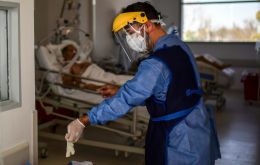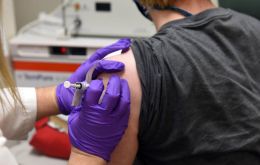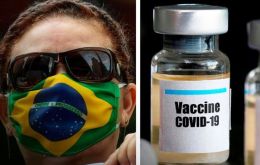MercoPress. South Atlantic News Agency
Tag: vaccine
-
Saturday, September 26th 2020 - 08:43 UTC
Latin American leaders call for free access to future Covid-19 vaccines

Latin American leaders have appealed at the United Nations for free access to a future Covid-19 vaccine, urging major powers to share their know-how for the sake of global well-being.
-
Saturday, September 26th 2020 - 08:22 UTC
Pope wants Covid-19 vaccine preferential treatment for the poor and weakest

The poor and weakest members of society should get preferential treatment when a vaccine for the coronavirus is ready, Pope Francis told the United Nations on Friday. Speaking from the Vatican in a video address to the UN General Assembly, Francis said the worldwide pandemic had highlighted the urgent need to promote public health and ensure access to vaccines.
-
Tuesday, September 22nd 2020 - 08:51 UTC
Latin American countries plan to join WHO's virus vaccine COVAX; ask for more time to sign

Brazil and Argentina, Latin American nations seeking more time to commit to the global COVID-19 vaccine facility known as COVAX, said they intend to so as soon as possible after missing Friday’s deadline.
-
Saturday, September 19th 2020 - 09:57 UTC
Brazil slashes tariffs to zero on imports of Covid-19 vaccines and related inputs

Brazil slashed temporarily the import tax on COVID-19 vaccines and other products related to the fight of the new coronavirus. According to the resolution from the Ministry of Economy's Chamber of Foreign Trade, CAMEX, the objective is to “facilitate the fight against the pandemic”.
-
Tuesday, September 15th 2020 - 09:40 UTC
AstraZeneca Oxford University Covid-19 vaccine trials resume in Brazil

Clinical trials for the coronavirus vaccine being developed by AstraZeneca PLC and Oxford University resumed in Brazil on Monday after the country’s health regulator got confirmation over the weekend that its British equivalent MHRA had approved the restart, a company representative said.
-
Saturday, September 12th 2020 - 10:24 UTC
The Brazilian state of Bahia signs deal for Russia's vaccine against Covid-19

The Brazilian state of Bahia has signed an agreement to conduct Phase III clinical trials of Russia's Sputnik V vaccine against COVID-19 and plans to buy 50 million doses to market in Brazil, officials have said.
-
Wednesday, September 9th 2020 - 09:55 UTC
AstraZeneca and Oxford University suspends vaccine trial following adverse reactions from US volunteer

AstraZeneca has paused a late-stage trial of one of the leading COVID-19 vaccine candidates after a suspected serious adverse reaction in a study participant, health news website Stat News reported on Tuesday.
-
Wednesday, September 9th 2020 - 09:49 UTC
Brazil Health minister announces the Covid-19 vaccine for next January

Brazil's acting Health Minister Eduardo Pazuello said on Tuesday that a Covid-19 vaccine would be rolled out for all Brazilians in January 2021.
-
Monday, September 7th 2020 - 09:14 UTC
A quarter of Brazilian population not convinced about having the Covid-19 vaccine

Five percent of Brazilians would refuse under any circumstances to take a vaccine against coronavirus and a further 20% indicated they might not take it, according to a survey published in newspaper O Estado de S Paulo on Sunday.
-
Saturday, September 5th 2020 - 08:26 UTC
“Don't expect widespread vaccination against Covid-19 until middle of next year”

World Health Organization spokeswoman said on Friday it does not expect widespread vaccinations against COVID-19 until the middle of next year, stressing the importance of rigorous checks on their effectiveness and safety.
